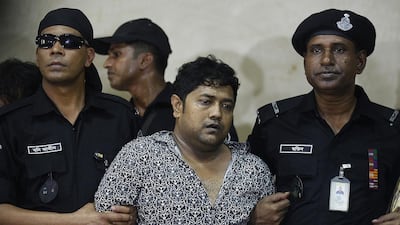A Bangladesh court on Tuesday jailed the Rana Plaza owner for three years for graft, the first of many charges laid against him after the garment factory complex collapsed in 2013 and killed more than 1,130 people.
Sohel Rana was given the maximum three-year sentence by a special court in Dhaka for failing to declare his personal wealth to Bangladesh's anti-graft commission, one of a series of charges brought after the disaster.
"This is the first time he has been convicted and jailed," said prosecutor Salahuddin Eskander.
Mr Eskander said Rana, who faces four other charges, including murder, for his role in one of the world's worst industrial tragedies, was in court for the verdict.
He and 37 others could be sentenced to death if found guilty of murder over the factory complex's collapse. But that trial has been delayed by appeals in the higher court.
Read more: Bangladesh garment workers stage tearful protest, four years after factory collapse
Rana was arrested just days after the accident at the border with India as he tried to flee Bangladesh.
He became the nation's public enemy number one in the aftermath of the disaster as survivors recounted being forced to enter the building to work despite complaining about cracks appearing in the walls.
Rana and 17 others have also been charged with violating building codes when extending the six-storey structure by a further three floors. The illegal construction was blamed by investigators for the tragedy.
His lawyer Faruque Ahmed said Rana would appeal the verdict.
"He was in custody when he was served the Anti Corruption Commission notice to submit his wealth statement. In the jail he was not given enough time to meet his lawyer or his family," said Mr Ahmed.
The Rana Plaza disaster prompted sweeping reforms in the garment sector, including new safety inspections and higher wages in an industry that employs around four million workers, mostly women.
Bangladeshi activists welcomed the verdict against Rana, but urged prosecutors to fast-track a court date for his murder trial.
"It has been four years since the tragedy, and still this trial has not begun in full swing," said Kalpona Akter, head of the Bangladesh Center for Worker Solidarity.
"He is a cold-blooded murderer. He forced workers to work in a death chamber."
Rana, who was linked with the ruling Awami League party, also faces a narcotics charge.
The disaster highlighted appalling safety problems in Bangladesh's nearly US$30 billion (Dh110.2bn) garment industry, the world's second largest exporter after China's.
A host of western retailers had clothing made at the complex's five factories, including Italy's Benetton, Spain's Mango and the British low-cost chain Primark.
Bangladesh's anti-graft agency has accused Rana of purchasing property with suspicious funds. The agency is also investigating his parents for allegedly hoarding more than $2 million in ill-gotten gains.

